by Ivary & Paola | Dec 14, 2018 | In The Loop
La Lectura Y Ciencias
Culminating a very successful trimester in the best possible way! Good job 5/6 grade class!
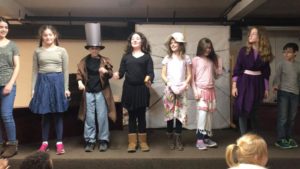
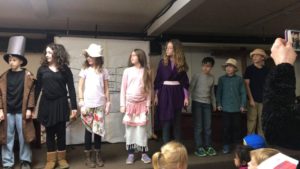
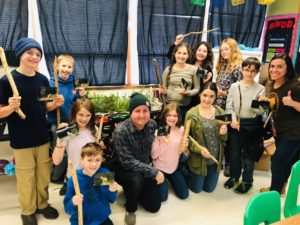
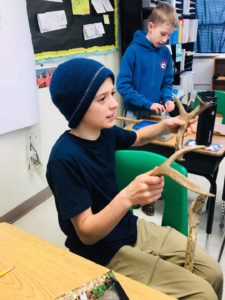
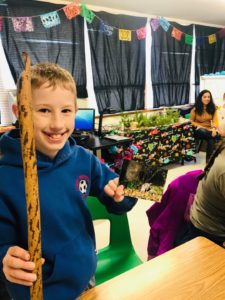
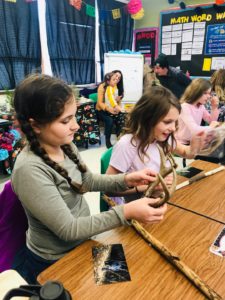
Mathematics
This week we began working with percents. Our objectives were:
- Understand percent notation
- Write equivalent fractions, decimals, and percents
- Find the percent of a number
History & Geography
This week we began learning about the Enlightenment. Our objectives were:
- Summarize John Locke’s philosophy about human knowledge and the responsibilities of
Government.
- Contrast Locke’s ideas with the ideas of Thomas Hobbes.
- Characterize the ideas of Montesquieu and Voltaire.
- Explain how the French ruling class tried to keep the message of the Enlightenment from reaching most French people.
English Writing & Spelling
Our objectives for writing were:
- To begin working individually on second narrative writing prompt
Greek and Latin:
- In this week’s greek and latin roots packet students focused on the roots sci, ology, and mem
by Sarah Segall | Dec 14, 2018 | In The Loop
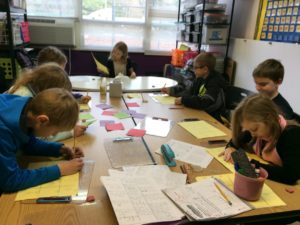
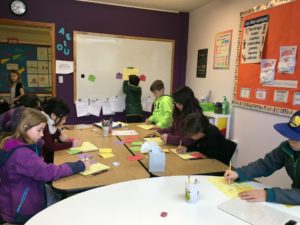 Mathematics w/Laura
Mathematics w/Laura
Fractions and Mixed Numbers
- Fractions as a Set
- Real-World Problems: Fractions
- Line Plots with Fractional Units
- Review
Next assessment: Monday and Tuesday
Puzzles available for extra credit and Friday (Math) Bingo
Remember: MATH …. It’s everywhere
La lectura
The students received a new project this week. They each selected a biography to read over the next several weeks. They brought a packet home detailing the requirements of this project. They must fill out the graphic organizer (which will be turned in), write a 3 paragraph report, and present a 3-5 minute speech, in the first person, as if they are the person. There is a clear rubric to help guide them to meet all the requirements.
We will, at times, read during class or work on the writing portion. Students have been asked to always have their biography available. It should go back and forth between school and home. They should also use their school account in Google Drive to do any writing. This way it will be accessible at both home and school.
The students will present their speech for the class on 1/22 and receive feedback. They will then present their revised speech for parents on 1/25. We will have a sign-up sheet a week or two before the presentations so parents will know when to come, if you are able.
Ciencias
How can we represent the different elevations of landforms?
This week, students continued their study of topography by building a model of a landform—a mountain. We learned all about contour lines and contour intervals. Students are now able to find the map key and use it to help them know the elevation interval and use this to find the flats and steep parts on topographic maps.
by Jill & Sarah | Dec 14, 2018 | In The Loop
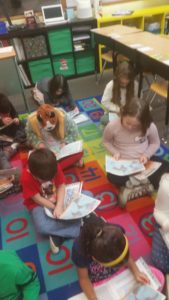
Finding Greece on our maps.
History & Geography
This week we finished our unit on Japan by writing postcards from Japan. Everyone had fun imagining what they might see while visiting the country. On Tuesday we began our next unit on Ancient Greece. The class will be working on an interactive notebook throughout this unit.
Our objectives:
• recall key landmarks, customs, and facts about Japan
• locate Greece and other places on a map
• understand what city-states were
• understand that the ancient Greeks worshipped many gods and goddesses
• identify several major gods and goddesses
Science
- This week we are wrapping up our science domain: Cycles in Nature. The class learned a song about the watercycle, made water cycle bracelets, set up a miniature water cycle for observation, and made different types of cloud pictures. On Friday we had a domain review.
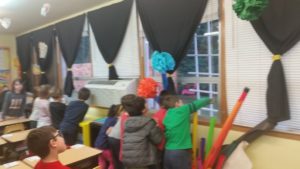
What kinds of clouds do we see?
Our objectives were to:
• Define the term water cycle
• describe evaporation and condensation
• identify forms and importance of precipitation
• describe the formation of clouds
• identify three types of clouds cirrus, cumulus, and stratus
• review what we have learned in this domain
English Spelling/Writing
In our journals we used the idiom of the week, “hold your horses.” The class got their new spelling lists this week and worked on sorting them in several ways. We had our practice spelling test on Thursday. Our new Word Wall words were: knew, know, kicked
La lectura
This week we read La historia de las tres ballenas.
Our weekly objectives were to:
- Focus on the consonant blends fl and fr
- Read our story the 1st time focusing on the comprehension strategy summarizing
- Read our story a 2nd time focusing on the comprehension skill main idea and details by creating main idea Christmas trees
Next week we will be review all the PUF words we’ve learned so far!
Las matemáticas
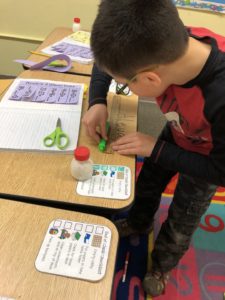
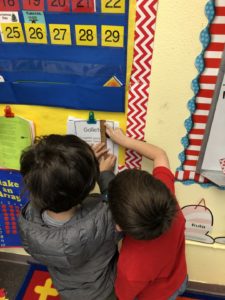 This week we continued working with Measurement. Our weekly objectives were to:
This week we continued working with Measurement. Our weekly objectives were to:
- Compare items that are measured in meters to each other by using the vocabulary taller (alto), shorter (bajo), longer (largo), and shorter (corto)
- Measure items in centimeters
- Decide when to measure items in meters or centimeters
by Sarah Segall | Dec 14, 2018 | In The Loop
La lectura
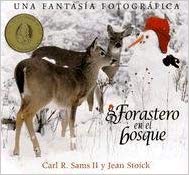 This week we read el forastero en el bosque. The kiddos really enjoyed this story with real photographs. Forest animals, awakened by the birds’ warning that there is a stranger in the woods, set out to discover if there is danger and find, instead, a wonderful surprise. This book led to sharing about the different snowmen they would make and what seeds and vegetables they would include.
This week we read el forastero en el bosque. The kiddos really enjoyed this story with real photographs. Forest animals, awakened by the birds’ warning that there is a stranger in the woods, set out to discover if there is danger and find, instead, a wonderful surprise. This book led to sharing about the different snowmen they would make and what seeds and vegetables they would include.
Our weekly objectives were to:
- identify beginning, middle, and end of a story
- retell important events from a story
- sequence events
- identify letters and read syllables
- listen to sounds and correctly write them (dictation)
Much to the kiddos’ disappointment, we did not have time to do our computer station, as there was no class on Friday. I bet they would all like a little time on www.estudiante.estrellita.com!
Las matemáticas
Our weekly objectives were to:
- measure items in the classroom by length and height
- use different non-standard units to measure
- compare the height and length of items within our classroom
- compare the length of items using different non-standard units and explain why the numbers are different
- count in sequence by 1’s and 10’s
- identify numbers out of sequence
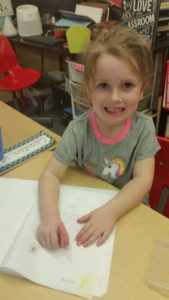 History & Geography
History & Geography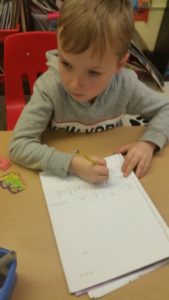
This week in our social studies unit we focused on the Puritans who became the Pilgrims in the New World. The class learned about why they left England and about their journey on the Mayflower. We worked on a timeline in class as well as pictures in our journals to describe our read-alouds. The class worked on coloring a map of the world and they are also learning a song about the continents and one about the oceans.
Our objectives this week were:
• identify the seven continents of the world and the oceans.
• Define what an Explorer is
• identify reasons why the pilgrims left England
• describe the pilgrims Voyage on the Mayflower
• make predictions prior to and during our lessons based on the information from previous or current lessons
• draw pictures to represent details or information from our read aloud in our journals
Science
In science we learned about nearsighted and farsightedness and we read the fable of the Seven Blind Mice. We also discussed the proverb “Better safe than sorry” and how this related to the fable. The class finished their sensory booklets and had fun with some optical illusion illustrations.
Our objectives were to:
• understand how we can enhance the sense of sight
• distinguish fantasy from realistic text
• describe how the five senses help humans learn about their world
• describe the challenges of someone who is blind
• review that a fable is a short made up story with moral that has animal characters that talk and act like people.
by Ivary & Paola | Dec 7, 2018 | In The Loop
La Lectura
• Identify the elements of a variety of literary genres: tales, poems, plays. Compare.
• Recognize, identify and admire the characteristics of lyric poetry and sonnet.
• Identify literary elements of poetry: rhyme scheme, meter, theme, word selection, figurative speech (metaphors and similes), personification, tone, etc.
• Take notes, summarize, restate, and paraphrase the key ideas of the text.
• Integrate knowledge and ideas and make text-to-text connections.
• Express ideas applying vocabulary with precision and accuracy at an academic level.
• Vocabulary and word studies: building academic vocabulary, roots of words.
• Grammar: Clauses and appositives. Understand how clauses and appositives can determine or complement the noun in a sentence.
• Spelling : Words with r y rr
• Identify the elements of a play.
La Obra de Teatro de nuestra clase
La clase 5/6 va a presentar una obra de teatro en jueves, el 13 de Diciembre a 2:30 PM. Es sobre la vida de Abe Lincoln y todos son invitados a venir a la cafeteria para verlo. Eso es el producto de mas de un mes de trabajo.
The 5/6 class is going to present a play on thursday, the 13 of december at 2:30 PM. It is about the life of Abe Lincoln, and everyone is invited to join us in the cafeteria. What you will view is the end product of more than a month of work.
Ciencias
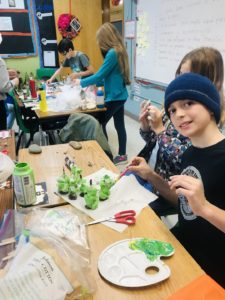
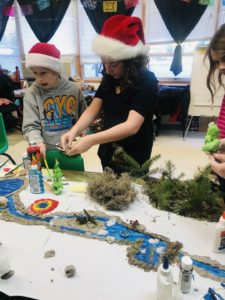
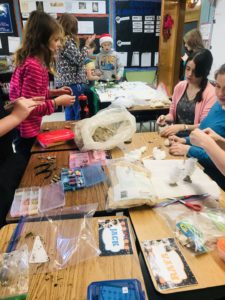
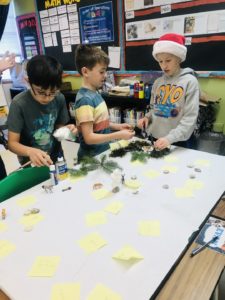
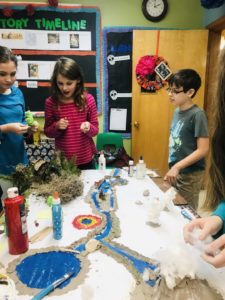
End of Science Module Project: Ecoscenarios
Students are introduced to ten new ecosystems in the U.S. and Puerto Rico. Each student will be given an ecosystem to study. They use a variety of resources, including the Internet and print materials, to work on their research of the ecosystems. The ecosystems all have an issue that poses a potential threat to the vitality of the system, such as acid rain, mineral extraction, habitat reduction, and so on. Students investigate and describe the ecosystem, including food webs and abiotic factors. Each student prepares an individual report and participates in a presentation of its findings. Students were given their topic of study on Friday. This project will be done in class next week, however, students are encouraged to do research and elaborate on this project at home so they are prepared for class work.
Mathematics
This week we wrapped up our chapter on Rates. Our objectives were:
- Solve rate problems including unit pricing and constant speed
- Solve problems involving rates and unit rates
- Demonstrate knowledge on the chapter test
History & Geography
 This week we began learning about the Enlightenment. Our objectives were:
This week we began learning about the Enlightenment. Our objectives were:
- Place the Enlightenment and its emphasis on science and human reason in historical context, and contrast the period with the Middle Ages and the Renaissance
- Explain how Newton’s scientific achievements influenced Enlightenment thinkers.
- Explain why Descartes is considered the father of modern philosophy.
- Explain Thomas Hobbes’s conclusions about human nature.
English Writing & Spelling
Our objectives for writing were:
- To begin working individually on second narrative writing prompt
Greek and Latin:
- Because students will be working on 2 more narrative writing pieces before winter break students will only be receiving their Greek and Latin roots packets these next few weeks
- In this weeks packet students focused on the roots vis, phon, and audi
Specialists
Character Education with Ms. Jennie
This month our theme is GENEROSITY. This past week we discussed different ways we can be generous out in the real world, such as buying a coffee for the person behind you in line, inviting a neighbor over for dinner, giving out snack bags to the homeless, or participating in a giving tree like we are doing at SWS. Our quote of the month is by Thomas Jefferson: “I believe that every human mind feels pleasure in doing good to another.” And we are reading a poem called Little Tree by e. e. cummings to celebrate the holiday season. We continue to read our chapter books in class too and do vocabulary, comprehension, and reader’s theatre.
by Sarah Segall | Dec 7, 2018 | In The Loop
Update: Miss Jill is recovering nicely. She still needs more time but we were so thrilled to face time with her at the end of the day Friday. It was good for the kids and for her!
Mathematics with Ms. Laura
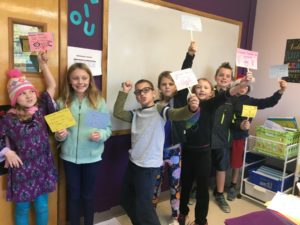
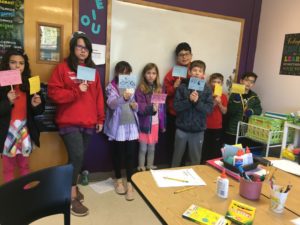
Fractions and Mixed Numbers
- “Improper” Fractions (but there is nothing improper about them!)
- Renaming “Improper” Fractions and Mixed Numbers
- Renaming Whole Numbers When Adding and Subtracting Fractions
- Real-World Problems: Fractions
Homework assigned Friday, December 7th is due Thursday, December 13th
(because there is no math class on Friday, December 14th: Conference Day)
Puzzles available for extra credit and Friday (Math) Bingo
Remember: MATH …. It’s everywhere
La lectura
We read all about Henry Wells and William Fargo this week. This was a biography explaining how these two men were so influential in the growth and development of the West and how they began their historic businesses. Their story illustrates one of the most basic rules of business: successful businesses must identify and fill a need.
Students will be picking a biography for an upcoming book report. This report and presentation will take place after the New Year.
Our main objectives this week were:
- to identify literary elements in our Biography: Henry Wells y Wiliam G. Fargo.
- to create a list of reading strategies and then use these to create a bookmark.
- to use analogies and antonyms to compare/contrast.
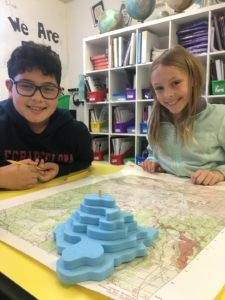
Learning all about topography!
Ciencias
This week we finished our second investigation: Landforms. Students took an assessment to demonstrate their understanding of the concepts. These concepts during this unit of study were the following:
- Weathered rock material can be reshaped into new landforms by the slow processes of erosion and deposition.
- Erosion is the transport (movement) of weathered rock material (sediments) by moving water or wind.
- Deposition is the settling of sediments when the speed of moving water or wind declines.
- The rate and volume of erosion relate directly to the amount of energy in moving water or wind.
- The energy of moving water depends on the mass of water in motion and its velocity. The greater the mass and velocity, the greater the energy.
- Fossils provide evidence of organisms that lived long ago as well as clues to changes in the landscape and past environments.
On Thursday, our class was introduced to our next investigation, Mapping Earth’s Surface. Please stay tuned to know more about this next week!
Specialists:
Character Education with Ms. Jennie
This month our theme is GENEROSITY. This past week we discussed different ways we can be generous out in the real world, such as buying a coffee for the person behind you in line, inviting a neighbor over for dinner, giving out snack bags to the homeless, or participating in a giving tree like we are doing at SWS. Our quote of the month is by Thomas Jefferson: “I believe that every human mind feels pleasure in doing good to another.” And we are reading a poem called Little Tree by e. e. cummings to celebrate the holiday season. We continue to read our chapter books in class too and do vocabulary, comprehension, and reader’s theatre.
by Jill & Sarah | Dec 7, 2018 | In The Loop
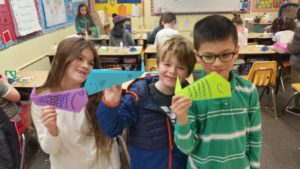 History & Geography
History & Geography
This week we continued our unit on Modern Day Japan. We learned about some important celebrations, customs, and ceremonies. We learned about how important harmony with nature is to the culture and ways it is represented in everyday life. The students designed a kimono, practiced some origami, and began writing a “postcard from Japan”. On Friday Yoko cam in to talk about her knowledge of Japan and it’s culture.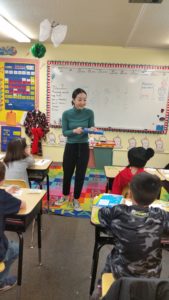
Our objectives:
• locate Japan on a map
• identify Japan as a country made up of four main islands
• identify the kimono as traditional Japanese clothing
• understand the importance of nature in Japanese traditional crafts
• understand the significance of bonsai, origami, and flower arrangements
•identify the bullet train of Japan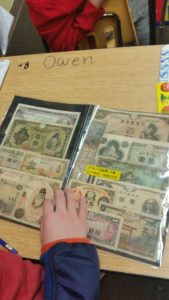
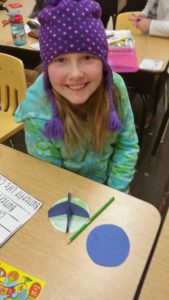
Starting our diorama
Science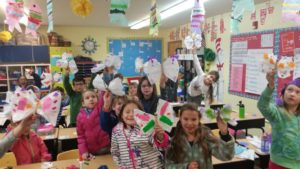
This week in our science domain Cycles in Nature we finished our work on the butterfly life cycle and began learning about the water cycle. The students worked on their butterfly life cycle diorama, made tissue butterflies and butterfly book marks.
Our objectives were to:
• explain that is cycle is a sequence of events that repeats itself again and again
• illustrate the life cycle of a butterfly and use proper vocabulary
• define the water cycle
• explain that there is a limited amount of water on Earth
• describe evaportation and condensation
English Spelling and Writing
Our idiom of the week was ” he’s pulling my leg.” The class wrote about the idiom and self edited their work in their journals. Our spelling assignment was to write each word 3 times and use them in a sentence. We had our sorts spelling test on Friday. Our new Word Wall words were: it’s, joke, just,
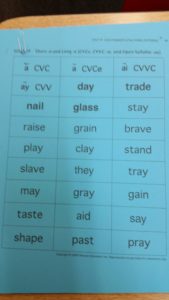
Next week’s sort for Blue group
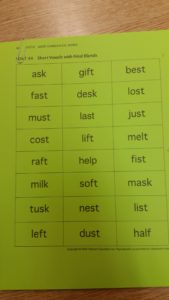
Next week’s sort for Green group
La lectura
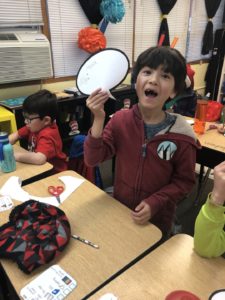 This week we read Corduroy.
This week we read Corduroy.
Our weekly objectives were to:
- Review words that begin with the letter h
- Read our story the 1st time focusing on the comprehension strategy making predictions
- Read our story a 2nd time focusing on the comprehension skill Making Inferences
- Understand when to use quotes in our writing and practice using them
Our PUF words for next week are: frío, flor, fruta
Las matemáticas
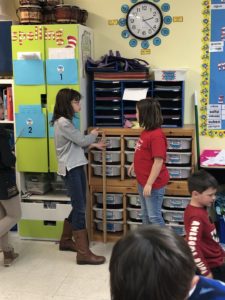 This week we completed our multiplication and division chapter and began working with measuring in meters. Our weekly objectives were to:
This week we completed our multiplication and division chapter and began working with measuring in meters. Our weekly objectives were to:
- Complete word problems using multiplication and division
- Demonstrate knowledge on the chapter test
- Compare items to a meter
Specialists:
Character Education
This month our theme is GENEROSITY. This past week we discussed different ways we can be generous out in the real world, such as buying a coffee for the person behind you in line, inviting a neighbor over for dinner, giving out snack bags to the homeless, or participating in a giving tree like we are doing at SWS. Our quote of the month is by Thomas Jefferson: “I believe that every human mind feels pleasure in doing good to another.” To celebrate the holiday season we are reading the famous poem “Twas the Night Before Christmas” and we are reading various books that focus on giving and generosity such as Silver Packages by Cynthia Rylant and Great Joy by Kate DiCamillo.
by Sarah Segall | Dec 7, 2018 | In The Loop
La lectura
This week we continued with our Friendship unit. We read a great story of a lonely prince. His parents give him everything he asks for, and none of it makes him happy. When he sees the gardner’s boy’s pet rabbit, he asks for the rabbit. The other boy won’t give up his pet but instead suggests that they play together and share the rabbit. William discovers that what he needs to be happy is a friend.
Our weekly objectives were to:
- Ask and answer questions during and after a story.
- Write about what they like to do in a story.
- Leave proper spacing between letters and between words.
- Identify the beginning, middle, and end of a story.
- Practice our dictation skills (based on our letter segments in Estrellita.)

Dictation shows what we know and is fun!
On Fridays the students will have the opportunity to work on the computer as one of their rotations (stations). They are very excited about this station! Please remember, they can access this program at home too.
Students will progress through a number of exercises for each lesson. The lessons correspond with the segments on the Sonidos chart we are working with in class.
Each lesson will provide students the opportunity to go from the known – the picture, to the unknown – the sound. They will have the opportunity to practice the Estrellita Sonidos chant, move from exposure to mastery and sequence through each segment in the same manner being used in our class – whole group lessons. Each lesson has different segments creating a scaffolding and sequential process that will accelerate their reading process. In order for them to achieve mastery, prior to learning the new segments, they will have a review, just like they have in class.
They must demonstrate mastery in order for the next lesson to be unlocked.
Las matemáticas
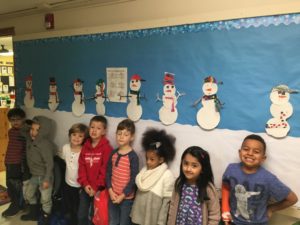
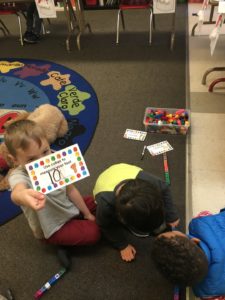 We had a lot of fun measuring things in the classroom this week! We are comparing the heights and lengths of items in the classroom using non-standard units. (Cubes, etc.)
We had a lot of fun measuring things in the classroom this week! We are comparing the heights and lengths of items in the classroom using non-standard units. (Cubes, etc.)
Our weekly objectives were to:
- identify who is taller than whom (______ es más alto que ________.)
- identify who is shorter than whom (______es más bajo que ________.)
- measure items in the classroom and record the measurement.
- Create a snowman glyph (pieces are chosen based on the answers to questions)
- Cutting circles isn’t tricky for us!!! (They all did such a great job with this. They cut all the snowman pieces all by themselves!!)
- We are counting higher and higher and by 10’s and even 5’s.
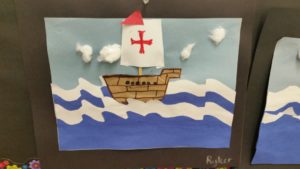 History & Geography
History & Geography
We continued our history unit on the first voyage of Columbus this week. We learned more about Columbus’s first and second voyages. The class learned a song to go with this section, acted out how the first voyage was like for the sailors, and made a picture depicting one of the ships. Some chose to add a sea monster to show some of the sailors’ fears along the way.
Our objectives this week were:
• identify the continents of North America, South America, Europe, Africa, and Asia
• recall the year of Columbus’s first voyage to America:1492
• recall the names of Columbus’s three ships mean yeah, Pinta, in Santa Maria
• describe the accomplishments of Christopher Columbus
• explain why Columbus called the land where he landed “India” and the inhabitants “Indians”
Science
This week in science we read short biographies about Ray Charles and Helen Keller. The class watched a video of Ray Charles performing a song and a short film on Helen Keller. We continue to work on our sensory booklet and made a touch book.
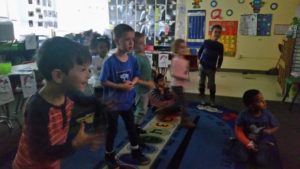
Dancing and clapping to Ray Charles
Our objectives were to:
• describe the experiences and challenges of someone who is blind and/or deaf
• explain the contributions of Ray Charles and Helen Kellar
• understand what a biography is
• recall a general timeline of Helen Keller and Ray Charles’s life
Specialists:
Character Education with Ms. Jennie,
This month our theme is GENEROSITY. This past week we discussed different ways we can be generous out in the real world, such as buying a coffee for the person behind you in line, inviting a neighbor over for dinner, giving out snack bags to the homeless, or participating in a giving tree like we are doing at SWS. Our quote of the month is by Thomas Jefferson: “I believe that every human mind feels pleasure in doing good to another.” To celebrate the holiday season we are reading the famous poem “Twas the Night Before Christmas” and we are reading various books that focus on giving and generosity such as Silver Packages by Cynthia Rylant and Great Joy by Kate DiCamillo.
by Sarah Segall | Dec 1, 2018 | In The Loop
Holiday Parent’s Night Out
Thursday, December 13th
4:30-5:30
Games, dinner, and a movie.
$15 (Payment due at the time of sign up.)
Sign up in the main office. Limited to the first 30 students.






































